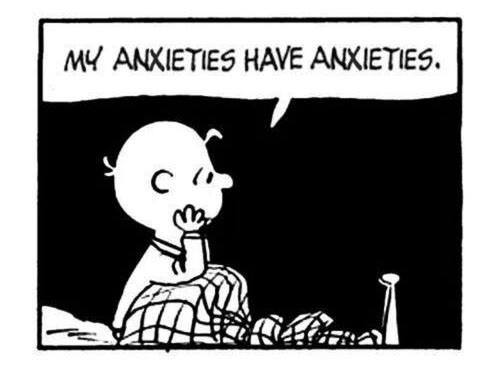Anxiety: A feeling of worry, nervousness, or unease about something with an uncertain outcome.
Anxiety Disorder: A mental health disorder characterized by feelings of worry, anxiety or fear that are strong enough to interfere with one’s daily activities.
Anxiety is good in very small doses. However, the distinction between anxiety disorders and “normal” anxiety isn’t always clear, which misleads us into thinking “It’s okay, it’s just normal human behavior”. No, it isn’t.
How can you tell if your ‘normal’ anxiety has crossed the line to become a disorder? It’s not easy. Anxiety comes in many forms—panic attacks, phobia, social anxiety—and the distinction between an official diagnosis and “normal” anxiety isn’t always clear.
Here’s a start: If you experience any of the following symptoms on a regular basis, you may want to talk with your psychologist.
1)Muscle tension
Constant muscle tension—be it clenching your jaw, balling your fists, or flexing muscles throughout your body—is often a sign of anxiety disorder. The horrifying part about this symptom is that because it can be so persistent and pervasive, people who have lived with it for a long time may stop noticing it after a while, making them ignorant about their disorder.
Regular exercise can help keep this under control, but the tension may flare up if an injury or other unforeseen event disrupts a person’s workout habits.
2)Self-consciousness
If you’re having a hard time making one-on-one conversations at a party, or eating and drinking in front of even a small number of people, do not mistake it for being an ‘introvert’. Social anxiety disorder doesn’t always involve speaking to a crowd or being the center of attention.
People with social anxiety disorder tend to feel like all eyes are on them, and they often experience blushing, trembling, nausea, profuse sweating, or difficulty talking. These symptoms can be so disruptive that they make it hard to meet new people, maintain relationships, and advance at school or work.
3)Sleep problems
Again, anxiety in very small doses is good. It’s not unusual to toss and turn with anticipation on the night before a big speech or job interview.
But if you chronically find yourself lying awake, worried or agitated—about specific problems (like money), or nothing in particular—it might be a sign of an anxiety disorder. Statistically, half of all people with GAD experience sleep problems!
Another tip-off that anxiety might be involved? You wake up feeling wired, your mind is racing, and you’re unable to calm yourself down.
4)Chronic indigestion
Anxiety may origin in the mind, but it often manifests itself in the body through physical symptoms, like chronic digestive problems. Do NOT ignore physical symptoms! Irritable bowel syndrome (IBS), a condition characterized by stomach aches, cramping, bloating, gas, constipation, and/or diarrhea is basically an anxiety in the digestive tract.
The gut is very sensitive to psychological stress—and, vice versa, the physical and social discomfort of chronic digestive problems can make a person feel more anxious.
5)Irrational fears
At times, anxiety is attached to a specific situation or thing—like flying, animals, or crowds—factors much distinct from ‘general’ anxiety. If the fear becomes overwhelming, disruptive, and way out of proportion to the actual risk involved, it is a strong sign of phobia, a type of anxiety disorder.
Phobias may not be obvious at all times. In fact, they may not surface until you confront a specific situation and find yourself incapable of overcoming your fear. A person who is afraid of snakes can go for years without having a problem, but when their kid wants to go camping, and they realize they need treatment.
Don’t mistake anxiety for a adrenaline rush. Consult a clinical psychologist before it grows onto you.

